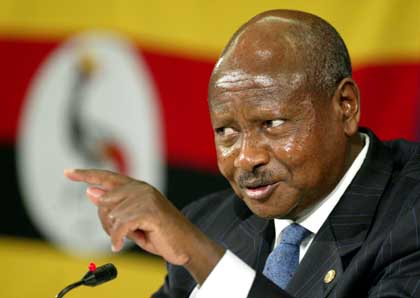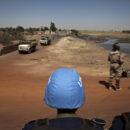Uganda in trouble: Museveni should now enjoy a well-earned retirement – By Richard Dowden


Yoweri Museveni has promised to step down when he finds a suitable replacement. Unsurprisingly, the search continues..
Three tell tale signs. Firstly it was discovered that the 16-strong Uganda Olympic team was outnumbered by the officials accompanying it, many of whom are paid five times what the athletes receive. Much of the money that was supposed to be spent on training was “˜eaten’. If you don’t care if your national sports team wins, then you probably won’t care if your country becomes a winner.
Secondly, I visited the Uganda National Museum last week and it did not seem to have been swept, cleaned or updated since my last visit in 2006. The only new and witty (but puzzling) addition I could see was a portrait of the British Queen Elizabeth in a Basuti, the grand formal Ugandan dress. I have visited the museum irregularly since 1971 and it has grown increasingly shabby, outdated in concept and presentation. Last year it emerged that the government wanted to sell off the site and build a 60 storey office block. Only a public outcry prevented it. It reminded me of that line by the Benin artist Romuald Hazoume on slavery, “They didn’t know where they were going, but they knew where they had come from. Today they still don’t know where they are going, and they have forgotten where they come from”.
The third tell-tale and most worrying sign is that whenever people talk politics in a public place they now drop their voices.
Uganda is in trouble. These small but significant indications are supported by an almost universal fury among Uganda’s professional and business class at the arrogance and corruption of the narrow ruling elite, mainly from the west of the country, who have been in power since 1986. Yoweri Museveni, the man who once said that Africa’s major problem was that rulers stayed on too long, has been President for 26 years. This week he said that he would step down when he had identified a successor with vision who must be “a nationalist, patriotic and pan African, one that promotes social economic transformation and is democratic”.
But it is in the nature of those in power to accumulate more and more of it. The longer you stay in power, the smaller the chances of a good new leader emerging. Like a great tree that prevents anything growing underneath it, a powerful ruler is almost always followed by a technocrat or a rebel. Museveni has tried to find a successor, but when a man tries to make his son and then his wife his political heir, you know he has no real intention of relinquishing control. And the worst news for Uganda’s politics is that 2.5 billion barrels of oil are due to come on stream shortly. Name three oil producing countries in Africa and the Middle East which are genuine democracies.
Museveni liberated his country, or at least the southern part of it, in the early 1980s. He brought a new vision and established security. His army was disciplined and well behaved – though exactly what happened when it crossed the Nile and invaded the north is still to be properly documented and analysed. I lived in Uganda during the first two years of Idi Amin, I visited it after he was driven out in 1979 and saw the horrors of the Obote 2 regime and appalling brutality of the Okello military rule. In his first few years in power Museveni re-established the Uganda state, law and security. No one can ever take that away from him and the National Resistance Movement. In those days when he came to London he would invite Africa journalists for a chat. He was full of ideas and his eyes twinkled with delight at a verbal fencing match with us. Last year I met him briefly at his vast Chinese-built palace at Entebbe. He greeted me formally and I was dismissed. The eyes were dead. He looked utterly exhausted.
Fortunately, there are still some good people in his party who have not built themselves palaces with stolen money. There is also a new generation that is not afraid to disagree with their elders. There is time for a new leader to establish herself or himself, and head into the 2016 election with a good chance of winning. The opposition is fragmented, in disarray and needs new leadership. But free and fair elections are still possible if the government has the will and courage to let them happen. The alternative is that the next regime-change in Uganda will eventually be asserted by traditional methods – the coup or the war.
***
Seeing so many people of African origin doing so brilliantly at the Olympics I wonder what the Olympics medal tables will look like when all African national sports bodies do get their act together as the Kenyans and Ethiopians have done.
***
A wonderful Afrikaner saying from an agriculture debate in Johannesburg last week: “Everything in Africa is edible – if you don’t eat it, it will eat you.”
Richard Dowden is Director of the Royal African Society and author of Africa; altered states, ordinary miracles. For more of Richard’s blogs click here.







[…] Name three oil producing countries in Africa and the Middle East which are genuine democracies. Â Read more… Share this:ShareTwitterFacebookLike this:LikeBe the first to like this. This entry was posted in […]
Richard,
This nice and provocative read! Thank you. However, I firmly believe that the real genesis of Museveni was never really scrutinized of analyzed in depth. If you look at the man today, you see obvious traits of Machiavelism and an obvious student of the likes of Franton et al. He is very much the personification of the ‘the end justifies the means” philosophy and ilk.
His history as a young man though shrouded in secrecy is itself almost the resulting product of the man. He always ambitious and even his very close friends saw his early quest for the Presidency of Uganda as an obsession. No doubt it was to be attained by any means possible.
Why was this young relatively insignificant soldier suddenly thrust into the limelight, especially, after the Liberation war that was largely engineered by the likes of Nyerere, Obote etc? You may have read that his influence stemmed from the fact that he actually had his own army within the liberation group, composed of trusted recruits who would later provide the troops to oppose Obote 2. Many questions still linger as to what his Army,FRONASA, was responsible for in that war but the design of his plans was to discredit Amin at every turn which I also believe included the intentional, deliberate sacrifice of innocent Ugandan lives. Some of it is difficult to believe but in all intent purposes very similar results would later emerge in his escapades in the Congo, Luweero and even as you rightly state, Northern Uganda.
This talk of having lost an unfair election in 1980 was all a ruse to any clear thinking Ugandan, his party won “one’ seat in a poll where he, as a person, also lost in his very own home constituency. Thus the machiavelism kicked in, at any cause he “had’ to be president. I still believe that Uganda would have found peace with itself if this chaps ego had been in check. For him the only way to deal with this was violence. What ensued was a war that claimed hundreds and thousands of lives. Surely if he is the natural leader with the only “ vision “ as he says he is , some sort of diplomacy or peaceful movement would have emerged from within. Remember he was also part of the top brass running the country at that time and certainly as a “liberator†he would have made his mark on the future from his laurels as a heroic soldier.
Stories are abounding about some of his methods and certainly clear traces are emerging in the current impasse we have that is Uganda today. He was and still is a master of deceit, cunning and devilish propaganda. Methods undoubtedly not only used in the Jungles of Luweero but in the subsequent ousting of Amin. Do you know that he spread and initiated a terror campaign against Muslims in his home land of Bushenyi? He was after all in charge of security at the time and did you know that he destroyed buildings in Mbarara in order to further dent the reputation of the fleeing Amin soldiers ( the kind of propaganda he is used to )?
Ask anyone , the only problem is Ugandans have a tendency to have selective amnesia on most occasions.
The terror propagated by him on the people of Luweero was the only medium he knew how to discredit the Obote government, one of his Generals is on record as saying they had to kill the locals under the guise of the Obote troops to garner support. This pattern is all too familiar to anybody who lived through the Kony heydays in Achoil, Northern Uganda.
Poor Obote and his goons, they were used and the disadvantage of fighting a war hardly 20Kms from the city of Kampala was too much for the bumbling idiots that they appeared to be. The Army could hardly be controlled and thus went amok with all sorts of atrocities. Note that by 1985 before the split in the UNLA Museveni had been routed and was no longer a military threat, he only exploited disunity and disregarded any decorum to make a mockery of the peace talks that he only by chance happened to be invited to.
Where I am going with this? Museveni has been a terrible accident of history to Ugandans, although the first ten years of his rule where relatively fair. The western press, guys like you Richard bought his crap whole heartedly and I must say created an even bigger monster by giving him credit in abundance. History will certainly judge him and if you think this is long winded and malicious writing , get set to see how many grievances will emerge when that “war or Coup “as you put will be brought to the fore!
Dear Mr. Dowden,
I send you my utmost respect and want to say again that you are doing a wonderful job with the RAS.
I must, however, state that this article is far from your best work. While I agree with your overall statement – that the signs are not good for Museveni – I feel the manner in which you have said it is at fault. Please feel free to take a look at my paper outlining what Afro-pessimism is (though you know the concept well and usually argue against it) because unfortunately your article here possesses many checks on that metaphorical list. The terminology, imagery, quotation, and sweeping statements are not what I have come to expect from your term in the RAS.
For this reason, I respectfully request that you rewrite it to better reflect what you usually argue for yourself. In the very least, please add an addendum to your own recent piece: To John Humphreys On His Trip To Liberia – “You Can’t Come Here With European Eyes†(https://africanarguments.org/2012/04/11/you-can’t-come-here-with-european-eyes-a-letter-to-john-humphreys-on-his-trip-to-liberia-by-richard-dowden/).
My apologies for this less than stellar response, however, this article has concerned me greatly.
Interesting analysis.
An NTV Kenya correspondent last year dared to put the question: how come after all these years you have not been able to find, raise up or groom a successor who fills your conditions? Is this not a failure of your system and methods ? [Or words to that effect] He looked flummoxed and did not answer.
The above opinion commentary by Dowden is important in the advancement of a proper deliberative democratic system which in Uganda appears to be most disfunctional as evidenced in the conduct of various political elites who are primarily concerned for their own personal private needs.
This continuation of this debate as what constitutes proper prescriptive good governance for the people illustrates a fundamental characteristic of deliberative democracy—its process is dynamic. Although deliberation aims at a justifiable decision, it does not presuppose that the decision at hand will in fact be justified, let alone that a justification today will suffice for the indefinite future. It keeps open the possibility of a continuing dialogue, one in which citizens can criticize previous decisions and move ahead on the basis of that criticism. Although a decision must stand for some period of time, it is provisional in the sense that it must be open to challenge at some point in the future.
Deliberative democrats care as much about what happens after a decision is made as about what happens before. Keeping the decision-making process open in this way—recognizing that its results are provisional—is important for two reasons. First, in politics as in much of practical life, decision-making processes and the human understanding upon which they depend are imperfect. Therefore, we cannot be sure that the decisions we make today will be correct tomorrow, and even the decisions that appear most sound at the time may appear less justifiable in light of later evidence.
One important implication of this dynamic feature of deliberative democracy is that the continuing debate it requires should observe what we call the principle of the economy of moral disagreement. In giving reasons for their decisions, citizens and their representatives should try to find justifications that minimize their differences with their opponents. Deliberative democrats do not expect deliberation always or even usually to yield agreement. How citizens deal with the disagreement that is endemic in political life should therefore be a central question in any democracy. Practicing the economy of moral disagreement promotes the value of mutual respect (which is at the core of deliberative electoral democracy). By economizing on their disagreements, citizens and their representatives can continue to work together to find common ground, if not on the policies that produced the disagreement, then on related policies about which they stand a greater chance of finding agreement.
Deliberative democracy as a form of government in which free and equal citizens (and their representatives), justify decisions in a process in which they give one another reasons that are mutually acceptable and generally accessible, with the aim of reaching conclusions that are binding in the present on all citizens but open to challenge in the future. We can further refine it is meaning and defend it is claims by considering to what extent deliberative democracy is democratic; what purposes it serves; why it is better than the alternatives; what kinds of deliberative/participatory democracy are justifiable; and how its critics can be answered which in Uganda can be considered as crucial in terms of import.
Monte McMurchy
Nice piece Richard, I totally distaste the whole M7 and his ilk thinking;”the you owe us syndrome” I wish they could write us an invoice for all their costs in the bush, pay them and they walk! M7 has done away with the voice of reason in HIS party, all the sober minded friends of his have walked away from him or decided to keep quiet. Once an old comrade of his said “we thought we had fought a good fight,now am old I can’t fight on with these weary bones” he lamented. Many of the old guard speak like that,they struggled in vain. With the oil in sight, just wish this country luck given the fact that he keeps on saying he discovered it!